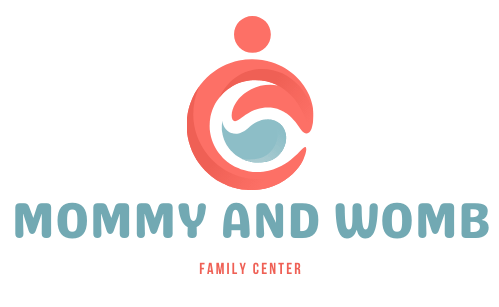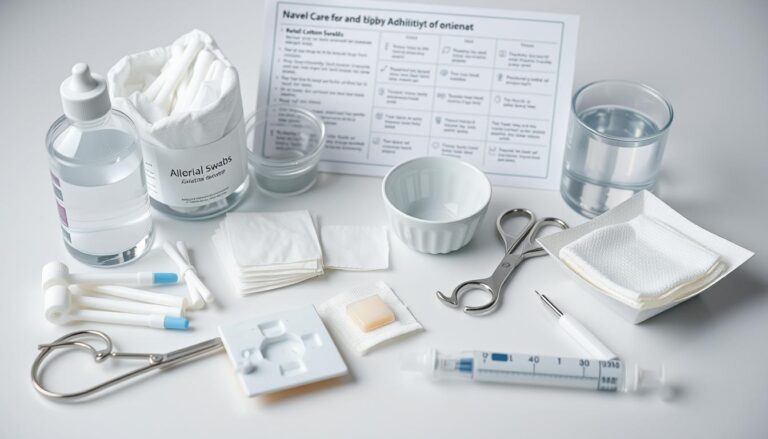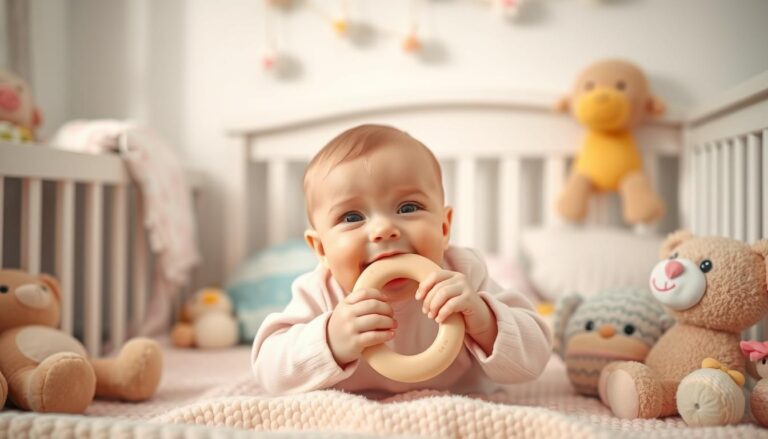Essential Tips for New Baby Care and Feeding
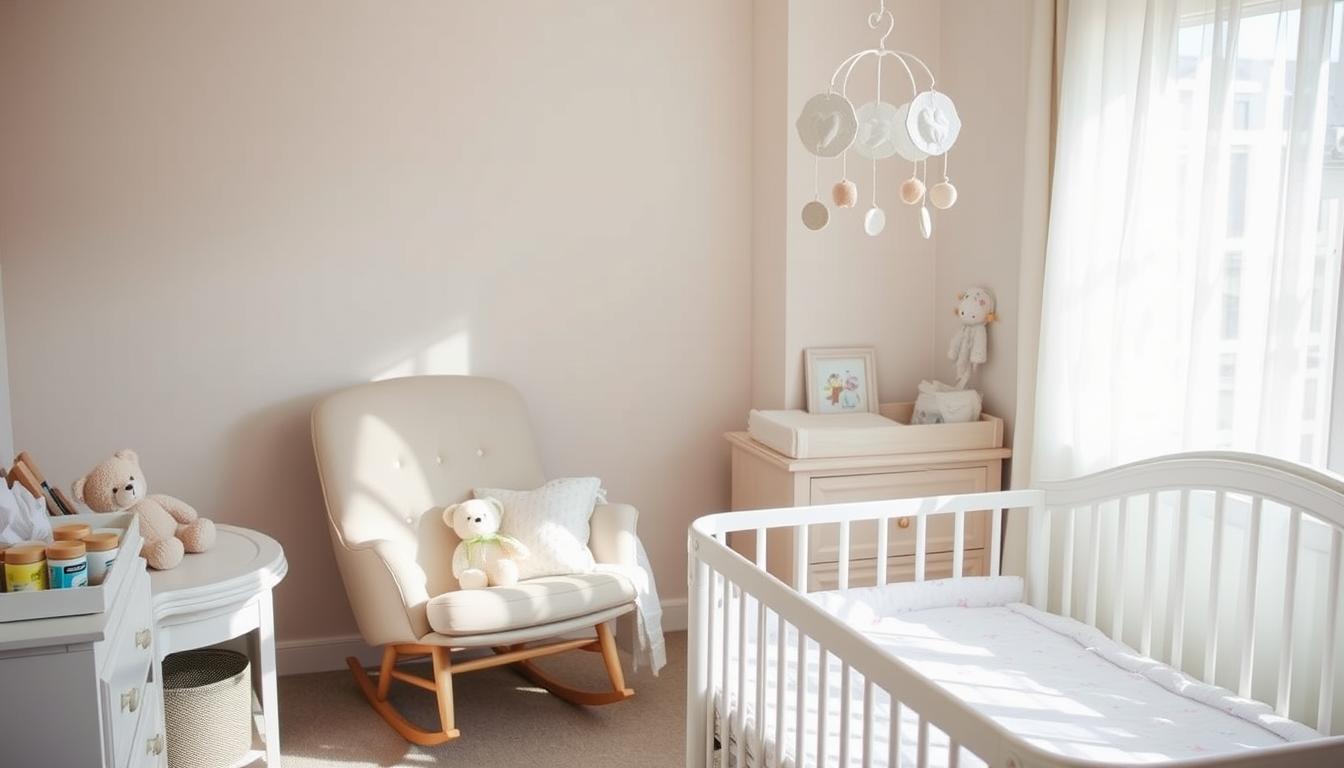
Starting your journey as a parent is both thrilling and daunting. The arrival of a newborn brings a mix of joy and uncertainty. But don’t worry, this guide is here to help. It’s packed with essential tips and knowledge for caring for your baby in the early days.
Table of Contents
This article is for all parents, new or experienced. It’s filled with tips to help your newborn get off to a great start. You’ll learn about creating a safe sleep space, feeding, and diapering. These practical tips will support your baby’s growth and health.
We’ll cover important topics like soothing a crying baby and postpartum care for mothers. With this guide, you’ll be ready to face the joys and challenges of early parenthood. You’ll feel more confident and prepared.
Caring for a Newborn
Keeping Your Newborn Warm and Clean
Caring for a newborn means meeting their basic needs. This includes keeping them warm and clean. Dress your baby in one to two more layers than you wear. Also, use a soft hat to keep their head warm.
For bathing, wait at least 24 hours before the first full bath. Start with gentle sponge baths for the first six weeks. Always watch your baby when they’re in water.
Keep the umbilical cord stump clean with a damp cloth every few days. It usually falls off in one to three weeks. Changing diapers often and letting them air-dry can prevent diaper rash. It’s normal for babies to poop four to seven times a day or once every seven days.
| Newborn Care Tip | Recommendation |
|---|---|
| Dressing | Dress your newborn in one to two more layers than you would wear |
| Bathing | Start with sponge baths for the first six weeks, never leave baby unattended in water |
| Umbilical Cord Care | Gently clean the stump with a damp washcloth every few days until it falls off |
| Diaper Hygiene | Change diapers frequently and allow for air-drying time to prevent rash |
Every newborn is different, and their needs can change. Be observant and trust your instincts. If you have questions, always ask your pediatrician for help with newborn care and newborn hygiene.
Establishing a Safe and Loving Environment
Creating a safe and nurturing home for your newborn is a top priority. Ensure your nursery meets current safety standards. Cribs should be up-to-date and kept at a comfortable temperature between 68-72°F (20-22°C). Stock up on essential items like various diaper sizes, baby clothes, toiletries, and a first-aid kit.
Selecting a trusted pediatrician is also crucial. Consider factors like location, credentials, and availability. Find the right healthcare provider for your family. Gather the necessary breastfeeding or formula feeding supplies, such as nursing bras, breast pumps, and burp cloths.
Babyproofing your home is a must. Anchor heavy furniture, use safety covers on electrical outlets, and keep small objects out of reach. Developing a strong support network with family, friends, and professional resources like lactation consultants can also make a world of difference for first-time parents.
As you create a safe and loving environment, don’t forget the importance of bonding with your newborn. Engage in skin-to-skin contact, make eye contact, talk, and read to your baby. These simple acts can greatly support your child’s healthy development and form a secure attachment.
“Babies communicate most effectively when they are in a quiet and alert state.”
Remember, your newborn’s comfort and security should be your top priority. By prioritizing a safe, nurturing, and bonding-focused environment, you’ll be well on your way to providing the best start for your little one.
Safe Sleep Practices
Keeping your newborn safe while they sleep is very important. A safe and comfy sleep area can lower the risk of sudden infant death syndrome (SIDS) and other dangers. By sticking to safe sleep rules, you help your baby get the rest they need to grow strong.
The American Academy of Pediatrics says babies should sleep in their own crib or bassinet, not in your bed. Keep their sleep area cool, quiet, and dark. Also, avoid making your baby too hot. Newborns sleep a lot, waking up every 2-3 hours to eat. Feeding them often in the first few months can help prevent SIDS.
Sharing a room with your baby for the first 6 months can cut SIDS risk by half. Don’t use soft bedding like sheets and blankets because they can cause suffocation. Also, avoid weighted products for babies.
Other important safe sleep tips include:
- Always place your baby on their back to sleep to lower SIDS risk.
- Human milk can also help prevent SIDS.
- Stay away from smoke, as it increases SIDS risk.
- Using a pacifier at nap and bedtime can also help prevent SIDS.
By making a safe sleep area and following these tips, you can protect your newborn. It’s important to stay informed about newborn sleep safety and SIDS prevention to ensure a safe sleep environment for your baby.
| Statistic | Value |
|---|---|
| Sleep-related deaths among U.S. babies in 2022 | Approximately 3,700 |
| Reduction in SIDS risk from room sharing | Up to 50% |
| Increased chance of sleep-related suffocation from not room sharing | More than 18 times |
| Increased chance of sleep-related suffocation from soft bedding | 16 times |
| SUID deaths in the United States annually | Approximately 3,500 |
“Putting babies to sleep on their backs reduces the risk of sudden and unexpected infant death significantly compared to other sleeping positions.”
Soothing Crying and Fussiness
Being a new parent can be tough when your baby cries a lot. But, knowing why they cry and how to calm them can help a lot. Newborns cry for many reasons, like hunger or feeling uncomfortable. By figuring out what they need, you can make them feel better and safe.
Tips for Calming a Crying Baby
Here are some ways to calm a crying baby:
- Holding and rocking – Hold your baby close and rock them. This can make them feel calm and secure.
- Shushing – Make a “shh” sound near their ear. It can block out other sounds and help them relax.
- Swaddling – Wrap them snug in a blanket. It feels like being back in the womb, which is comforting.
- Using soothing devices – Try baby swings, vibrating seats, or white noise machines. They can make a peaceful space.
If your baby cries a lot and you think it might be colic, talk to your pediatrician. They can help you find ways to comfort your baby.
“Consistency is key in establishing calming behaviors; parents should stick to a strategy each time the baby cries to help the baby learn and adapt.”
Feeding Your Newborn
Feeding your newborn is key, whether it’s through breastfeeding or formula feeding. Newborns have small stomachs and eat often, usually 8-12 times a day. They eat small amounts each time. Learning how to burp your baby is also important to help them get rid of gas and prevent spit-up.
If you’re breastfeeding, your baby can eat whenever they want. Experts say to feed newborns only breast milk for about 6 months. They should keep breastfeeding for 2 years or more. Newborns usually breastfeed at least 8 times in 24 hours in the first 2 weeks.
For formula-feeding, your baby might take 3-4 ounces at a time. They should eat at least 6 times in 24 hours. By the end of the first month, most formula-fed babies take in at least 3 or 4 ounces per feeding. Watching your baby’s wet diapers is important to make sure they’re drinking enough and gaining weight.
“Experts recommend feeding newborns on demand and advise feeding newborns only breast milk for about 6 months.”
Every baby is different, and their feeding habits can vary. If you have any worries about your newborn’s eating, talk to your pediatrician.
new baby care and feeding
Diapering and Hygiene Routines
Keeping your newborn clean is key to their health. A regular diapering and bathing routine helps. It keeps your baby clean, comfy, and avoids skin problems like diaper rash.
To avoid newborn diapering problems, change diapers often. Wipe from front to back. Let the area air-dry to stay dry and prevent diaper rash prevention. Clean the umbilical cord care stump with water only, avoiding ointments. Keep the diaper below it to aid healing.
- Change diapers regularly, at least every 2-3 hours or when soiled.
- Use a gentle, fragrance-free wipe or damp cloth to clean the area.
- Apply a thin layer of diaper rash ointment if needed.
- Allow the skin to air-dry completely before putting on a fresh diaper.
- Gently clean the umbilical cord stump with water, keeping the diaper below it.
Make a routine for bathing, diapering, and grooming. This keeps your baby clean and comfy. If you’re worried about your baby’s skin or hygiene, talk to your pediatrician.
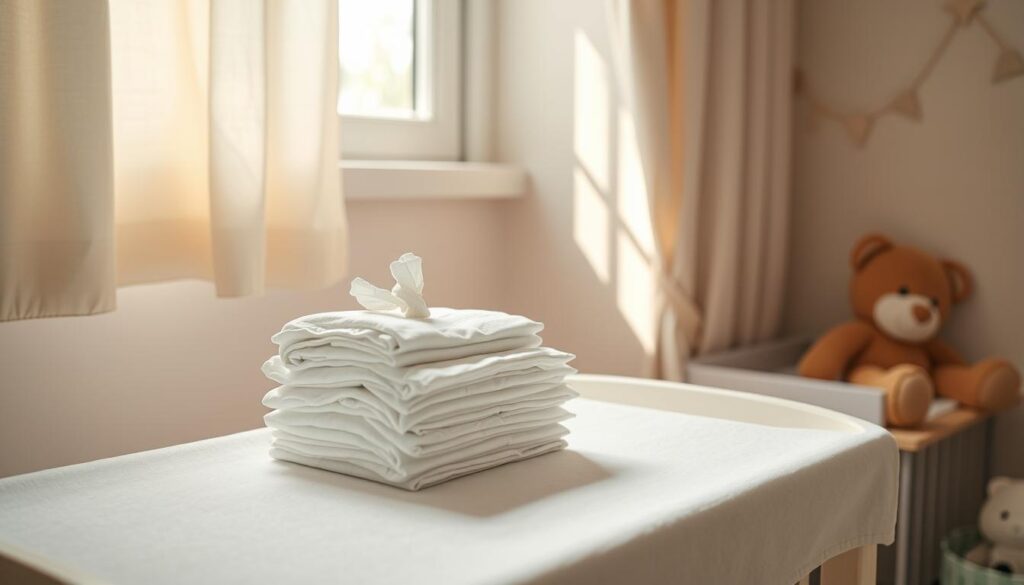
“Proper newborn diapering and hygiene routines are essential for keeping your baby healthy and happy.”
Promoting Healthy Development
It’s important to help your newborn grow in all ways. Make sure they get tummy time to strengthen their neck and arms. Also, play with them through reading, singing, and making funny faces. Don’t forget to go to well-baby visits with your pediatrician to check on their growth and learn about newborn development milestones.
Bonding with your newborn is key for their growth. When they cry, hold and comfort them. This doesn’t spoil them but makes them feel safe and confident. Try skin-to-skin contact, eye contact, and a soothing voice to strengthen your bond.
The early years are vital for a child’s growth. By being loving and supportive, and engaging in activities that help them grow, you’re setting them up for a healthy future.
“Responsive caregiving and nurturing relationships are essential for children’s healthy brain development and lifelong well-being.” – World Health Organization
Newborn Skin Care
As a new parent, it’s key to know your newborn’s skin needs. Their skin is very sensitive. Things like chemicals and dyes can cause irritation and dryness.
Addressing Common Skin Conditions
Newborns often face issues like cradle cap, eczema, and infant acne. Cradle cap is a scaly rash on the scalp that usually goes away in a few months. Eczema is a red, itchy rash that needs gentle, fragrance-free moisturizers.
Infant acne can show up on the face, scalp, back, or chest. It often starts between weeks two and six and goes away in a few months.
To keep your newborn’s skin healthy, bathe them only two to three times a week. This helps prevent dryness and irritation. For newborns with a cord, sponge baths once a week or less are best.
When it comes to diapering, use mild, fragrance-free cleansers or plain water. Avoid baby wipes with perfume or alcohol. Babies on antibiotics are more likely to get yeast infections and diaper rash.
Most newborn skin problems like eczema or diaper rash don’t show up for the first month or two. But, if you’re worried or if the problem gets worse, talk to your pediatrician.
“Research shows that touch triggers hormones, boosts immunity, and helps fight disease in babies.”
By understanding and addressing your newborn’s skin care needs, you can help ensure their comfort and overall well-being during this special time.
Coping as a Single Parent
Raising a newborn as a single parent is tough, but you can do it. Plan ahead and organize your home to make caring for your baby easier. This will help you manage the challenges.
Stock up on baby essentials like diapers and formula. Organize your home to create a peaceful space for your baby. Prepare meals in advance for quick, healthy meals during busy days.
- Ask family, friends, or caregivers for help to get breaks and time for yourself.
- Join a new parent support group online or locally to connect with others facing similar challenges.
- Make self-care a priority, like getting enough sleep and eating well, to handle stress and stay energized.
You don’t have to face it alone. Asking for help and taking care of yourself is key to giving your best to your newborn.
| Statistic | Value |
|---|---|
| Children living in single-parent households | 24 million |
| Single mothers with children | 14.5 million |
| Children living with cohabitating parents | 6 million |
| Children living in father-only households | 3.5 million |
By using available support and resources, you can face single parenthood with confidence. You’ll give your newborn the care and love they need to grow and thrive.
“I didn’t know how I was going to do it all, but with the help of my family and the support group, I found a way to manage and still have time for myself. It’s not easy, but it’s so worth it.”
Conclusion
Caring for a newborn is both rewarding and overwhelming. But with the right key takeaways for newborn care and support, you can feel confident. Make sure to focus on your baby’s safety, nutrition, and happiness. Also, don’t forget to take care of yourself and seek resources for new parents when you need them.
This guide has given you important tips and resources for caring for your baby. It covers setting up a safe space, feeding, and diapering. This information will be a great help as you start this new journey.
For more help, talk to your pediatrician, lactation consultant, or join local parenting groups. With the right advice and caring for your baby, you can enjoy the journey of new parenthood. This will help your family have a healthy and happy start.
